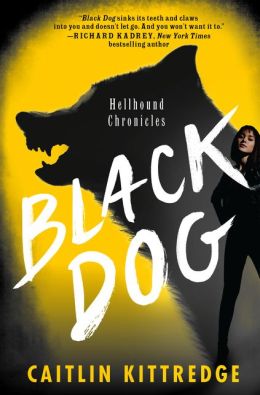The first in a fresh urban fantasy series, Black Dog by Caitlin Kittredge introduces readers to Ava—a hellhound who collects souls for a reaper, who is a sort of loan shark for demons—and her world. As the novel opens, Ava is under the thumb of her reaper, collecting overdue human souls; however, as the flap copy says, “when a human necromancer convinces her to steal her reaper’s Scythe, Ava incurs the wrath of the demon Lilith, her reaper’s boss.”
But Ava is involved in a plot that’s been going for a long, long time—longer than she could imagine—and as the politics of Hell and the Kingdom of Heaven become inextricably tangled up in her afterlife, she’ll have to find a way to keep surviving and staying one step ahead of her enemies.
In that past, I’ve appreciated Kittredge’s urban fantasy series; I’d read the Nocturne City novels and some of the Black London books a few years ago. So, I was looking forward to the first of the Hellhound Chronicles as some good light-hearted fun. It does have all of the pieces that I expect from a Kittredge novel: a tough but wounded female lead, a romantic subplot with an equally tough and attractive man, a gritty urban setting steeped in poverty and struggle, magic and politics, a fast-paced plot with a lot of action, et cetera.
The problem is that, in reading the novel, all of those pieces just seem like—pieces, ticked off of a generic checklist. The description on the back says “think Kill Bill with demons and gangsters instead of martial arts,” which could be a good thing, but unfortunately ends up pointing more to the fact that there’s not much depth or freshness to the world-building, the characters, or the stakes of the plot. I wanted to like it—I kept hoping to like it—but in the end I felt that Black Dog didn’t come through for me.
The characters in particular lack much development. Ava is primarily a set of tropes and traumatic experiences, and though there’s room to work with her past—she died during Prohibition, and has therefore “lived” through the better part of a century—the novel doesn’t do nearly enough with it. The majority of what we’re given as readers is the past she had with men, mostly men who abused her and eventually died. Instead of building an authentic or nuanced character, Kittredge primarily shows us experiences of abuse and rape—or attempted rape—as keystones for Ava’s personality.
I’m not saying that those experiences aren’t significant, but I do get a little tired of using sexual trauma as a shortcut to character development: of course she’s tough and determined to survive, right? Except that strategy just doesn’t work well for me.
The problem is compounded in Leo and—more so—Clint, neither of whom have particularly distinct personalities, dialogue, or motivations. Lacking specific traumas to signal that they’re Tough™, like Ava has, the men in the novel come across as a bit cardboard. I specifically would have liked to have had more of a sense of Leo as a Russian mobster; it doesn’t feel believable, as-is, because it seems like the majority of our engagement with him as such is his tattoos. It’s all surface-level with these folks.
Also, it’s difficult to believe in the romance between Ava and Leo when there doesn’t seem to be much chemistry between them as human beings—possibly because they don’t read as human beings (or supernatural beings, whichever). I wanted to appreciate the twist at the end that they’re fated to be together, but even that didn’t feel like much: possibly just an excuse for the unbelievable sticking-together from the first half of the novel. And the tossed-in sexual comments and refusals, none of which really convinced me.
The plot, too, sort of rolls along on a predictable tread. There are lots of people to worry about and lots of action scenes, but the stakes tend to be muddled by the shifts between Hellspawn politics with Leo’s feud with his father—a feud that seems to be used for the purpose of getting he and Ava together?—and then further by the sudden introduction of other characters and weapons and methods of attack. There’s not much that strikes me as well organized or gripping; it’s more one-thing-then-another, with action rolling along at a continual pace.
In the end, as I said, I wanted to like Black Dog—unfortunately, it just never managed to grab me. The whole affair feels a bit phoned-in, and though the prose is snappy and the general concept is neat, the pieces never come together to feel authentic and alive. Kittredge’s urban fantasies have been engaging in the past, and perhaps the second book in this series might bring it all around, but I didn’t feel enthusiastic about this one.
Black Dog is available now from HarperCollins.
Lee Mandelo is a writer, critic, and editor whose primary fields of interest are speculative fiction and queer literature, especially when the two coincide. She can be found on Twitter or her website.










